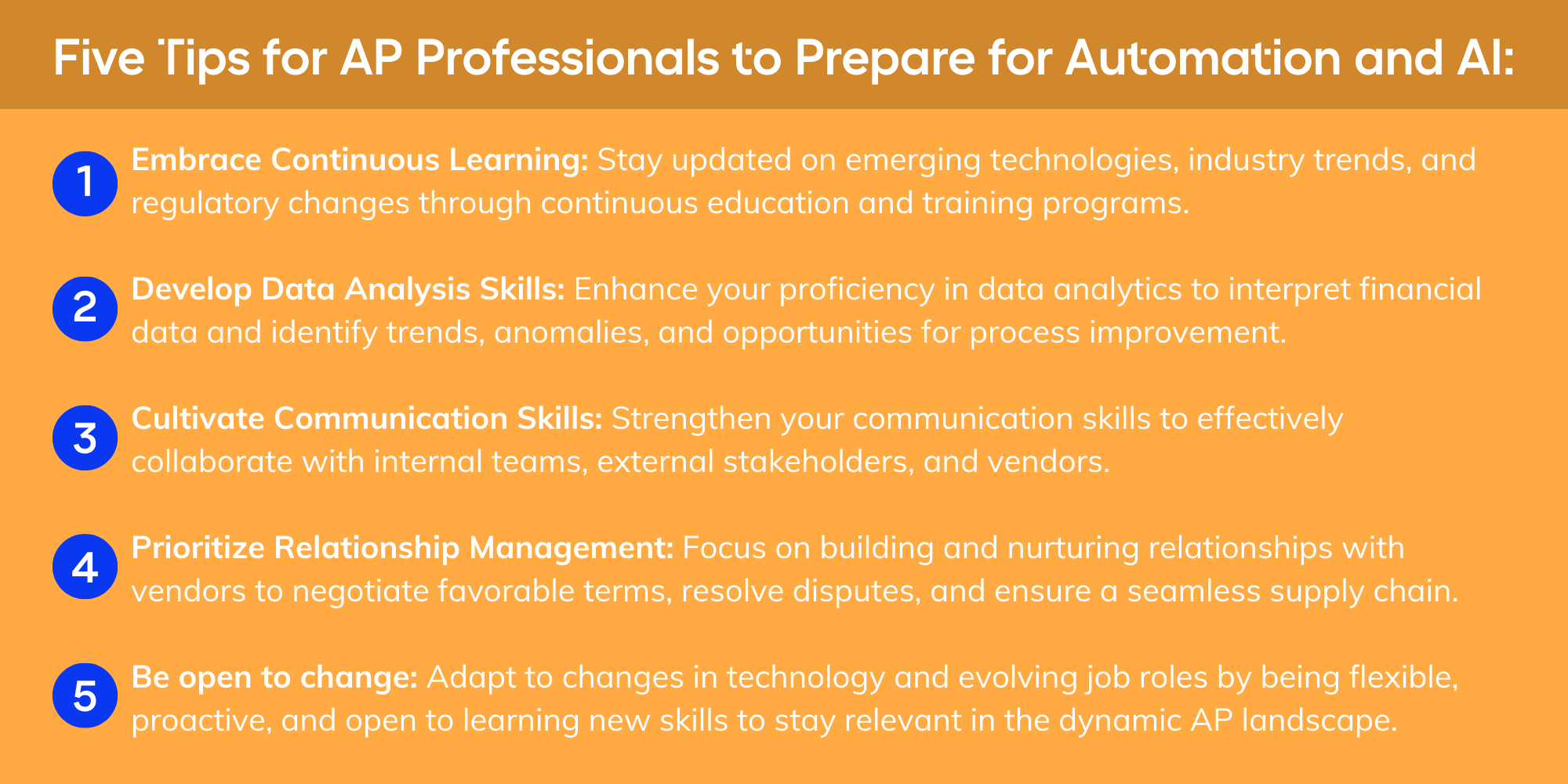Navigating the Impact of AI and Accounts Payable Automation
By James Stirk, CEO, Tradeshift
If you’re concerned about the potential impact of AI on your role, you’re not alone. Research by EY found that nearly two-thirds of employees are anxious about AI replacing their jobs. Finance departments, particularly accounts payable (AP), are at the forefront of this debate.
For an increasing number of businesses, the benefits of automating the accounts payable process are too hard to ignore. Processing invoices is a time-consuming and repetitive task that’s prone to human error. Currently, accounts payable (AP) teams spend around a quarter of their time chasing and correcting invoice exemptions, and more than four in five invoices require some degree of manual intervention. That explains why it costs an average of $10 and takes eleven days to process every invoice.
 The AP Automation Dividend
The AP Automation Dividend
AI-supported AP automation systems like Tradeshift Pay can process vast amounts of data incredibly quickly, extracting and categorizing invoices, verifying accuracy, and initiating payments seamlessly. The same technology can analyze historical transaction data to identify patterns and anomalies, improving the accuracy of invoice matching and reducing the risk of duplicate payments or fraudulent activities.
Through a combination of digitalization, supported by AI and AP automation, Tradeshift can already reduce the average invoice processing costs by a factor of five and slash the average processing time to under three days. Even then, that’s only scratching the surface of what we believe is achievable in the short-to-medium term.
Studies project that by 2025, 50% of business-to-business invoices worldwide will be processed and paid without manual intervention. Using context and clues gathered from historical data, we will soon do away with the approvals process entirely on certain recurring or low-value transactions from a trusted vendor. Tradeshift customers have already seen AI reduce manual interventions by as much as 99.5%.
 On the surface, at least, AP practitioners face an unwinnable battle against automation and AI-driven systems that are becoming more powerful and more sophisticated by the day. However, such a dystopian forecast neglects the high levels of knowledge and skill within the AP department that are largely untapped. It also ignores the countless lessons from history, reminding us that change is as much a creative force as it is a destructive one.
On the surface, at least, AP practitioners face an unwinnable battle against automation and AI-driven systems that are becoming more powerful and more sophisticated by the day. However, such a dystopian forecast neglects the high levels of knowledge and skill within the AP department that are largely untapped. It also ignores the countless lessons from history, reminding us that change is as much a creative force as it is a destructive one.
Historical Lessons and Adaptability
Back in the 1960s, three African American women, Katherine Johnson, Mary Jackson, and Dorothy Vaughan, were members of a team known as NASA’s “human computers.” Their story, brought to life in the movie ‘Hidden Figures,’ hinges on NASA’s decision to adopt the IBM 7090 to perform calculations in the blink of an eye that took the computer division hours.
Instead of letting a machine put these highly skilled technicians out of work, Dorothy Vaughan, the de facto supervisor of the team, learned how to program the 7090 and then trained the rest of her team.
A team that could have ended up becoming obsolete became some of the earliest computer coders. Indeed Katherine Johnson went on to use these computers to aid her calculations right up until her retirement in 1986.
The Opportunity for Accounts Payable
We can see many of the same characteristics of disruption, evolution, and opportunity in how AI and machine learning impact the accounts payable function. If data entry is what gets you up in the morning, then you are likely to face an uncertain future. But let’s face it, even the most dyed-in-the-wool AP clerk will tell you there are more valuable things he, or she, could be doing with their time.
As Jess Scheer, executive editor at The Institute of Finance and Management (IOFM), points out, finance is becoming more strategic. “AP aren’t just the people that are paying the bills anymore. They’re regulatory experts. They’re cash managers. They’re being asked to do more big data analytics, and they’re often the last line of defense against fraud.”

New Skills and Training
Strong data analysis and problem-solving skills will be highly valued as companies increasingly rely on data-driven decision-making. We’ll also see a growing demand for professionals who possess a combination of financial acumen and AI expertise. These individuals will be responsible for overseeing AI systems, validating outputs, addressing exceptions, and providing the necessary human touch to ensure accuracy, compliance, and effective financial management.
Adaptability and a willingness to continually update your skill set will be essential components in elevating AP professionals from their current transactional focus and into areas of more strategic work. Future training areas for AP managers and employees could include data and business analytics, cloud storage and other technology, data security, and online security.

Softer skills, including negotiation and effective communication, will also need honing. AP teams are perfectly positioned to take a far more proactive approach to monitoring and preserving the overall health of supplier relationships, something which has taken on renewed meaning and importance since the pandemic. For all the technical wizardry that allows automated and AI-driven machines to complete certain tasks faster and more accurately than their human counterparts, they’re far less capable when it comes to negotiating with a partner or resolving a dispute.
AP teams will also focus on building relationships with decision-makers both inside and outside of finance and supporting them in taking action based on the accounts payable data. For instance, this might include working with procurement teams to identify cost savings and supplier discount opportunities or collaborating with sales and accounts receivables to make accurate cash flow projections.
A Career Fit for the Future
Far from eliminating AP as a career choice, technology is already proving itself vital in securing and retaining talent. Research we conducted found that 62% of AP professionals would think twice before applying for jobs in finance departments that don’t have a solid automation strategy in place to eliminate the repetitive work they said was the worst part of their job. The same group of respondents said they felt automation would allow them to do more interesting work and climb the career ladder faster, all without sacrificing a healthy work-life balance.
We’re not saying the next few years will all be rainbows and unicorns. The efficiencies brought about by AI and automation will inevitably lead to a leaner AP function, and some entry-level positions may face a difficult transitionary phase. And yet, while doom-mongers may well leap on this as evidence of a coming wave of job losses, it’s an overly simplistic view.
Rather than replacing accounts payable jobs entirely, AI is poised to transform the nature of these roles in a way that secures its long-term future. When combined with the right level of investment in upskilling and training, the technology looks set to be a catalyst for the reinvention AP professionals have long been clamoring for, resulting in more of the high-value, high-reward work people actually want to do.
